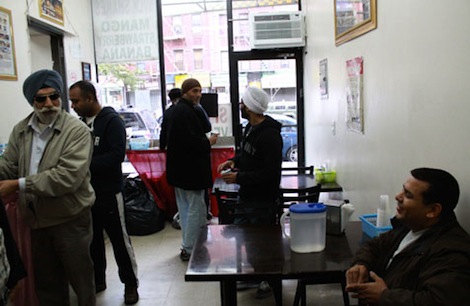Immigrant Jobs Keep New York City Running During Sandy
From taxi drivers to delivery men, immigrants work through the storm.
Oct. 29, 2012— -- With parts of New York City under mandatory evacuation, the stock market closed and Mayor Michael Bloomberg encouraging people to "have a sandwich out of the fridge and sit back and watch the television," it's pretty clear that Hurricane Sandy will take its toll on the local economy.
But many people are braving the weather to keep the city running. In particular, those with jobs like taxi driving, food delivery and healthcare will be hard at work over the next few days.
While the winds and rain picked up outside Doaba Deli in Manhattan Valley this morning, cab drivers stopping for traditional Punjabi breakfast appeared aware of the evolving storm but unrattled. Most planned to work for a few hours and quit early.
"I have a lot of bills, [and] I have two kids and wife," said Parkash Singh, a cabbie who lives on the eastern half of Long Island and commutes to the city to work. "It's a challenge day-to-day to make money, but life, every day is a challenge."

Parkash, far right, chatting with other taxi drivers after breakfast.
Subway and bus service shut down on Sunday night, and may not return until as late as Wednesday, leaving many New Yorkers dependent on those like Singh who are willing to work through the storm.
Immigrants make up half of all small business owners in New York City, according to a 2011 report by the Fiscal Policy Institute, and fields like taxi and limousine services, with 90 percent immigrant ownership, will be crucial during the hurricane. One cabbie estimated that only five percent of taxi drivers were on the road this morning, and in Manhattan Valley, traffic had slowed to a handful of cars at each light.
With damage estimates as high as $18 billion for the five boroughs, the hurricane will have a clear negative economic impact. But experts like Peter Morici, an economist and professor at University of Maryland, say the projected economic growth from rebuilding could offset some of those losses.
In a column in the Christian Science Monitor, Morici estimated that Sandy could cause up to $45 billion in damages. But "rebuilding after Sandy, especially in an economy with high unemployment and underused resources in the construction industry, will unleash at least $15 billion to $20 billion in new direct private spending," he wrote.
For taxi drivers working today, earnings appear to be relatively small. But that didn't stop Parkash Singh, who headed back to the road after a late breakfast. He took some preparations for Sandy, he said, but nothing too extensive.
"I have just umbrella and some water," he said. "If I'm stuck I can drink and get a break."